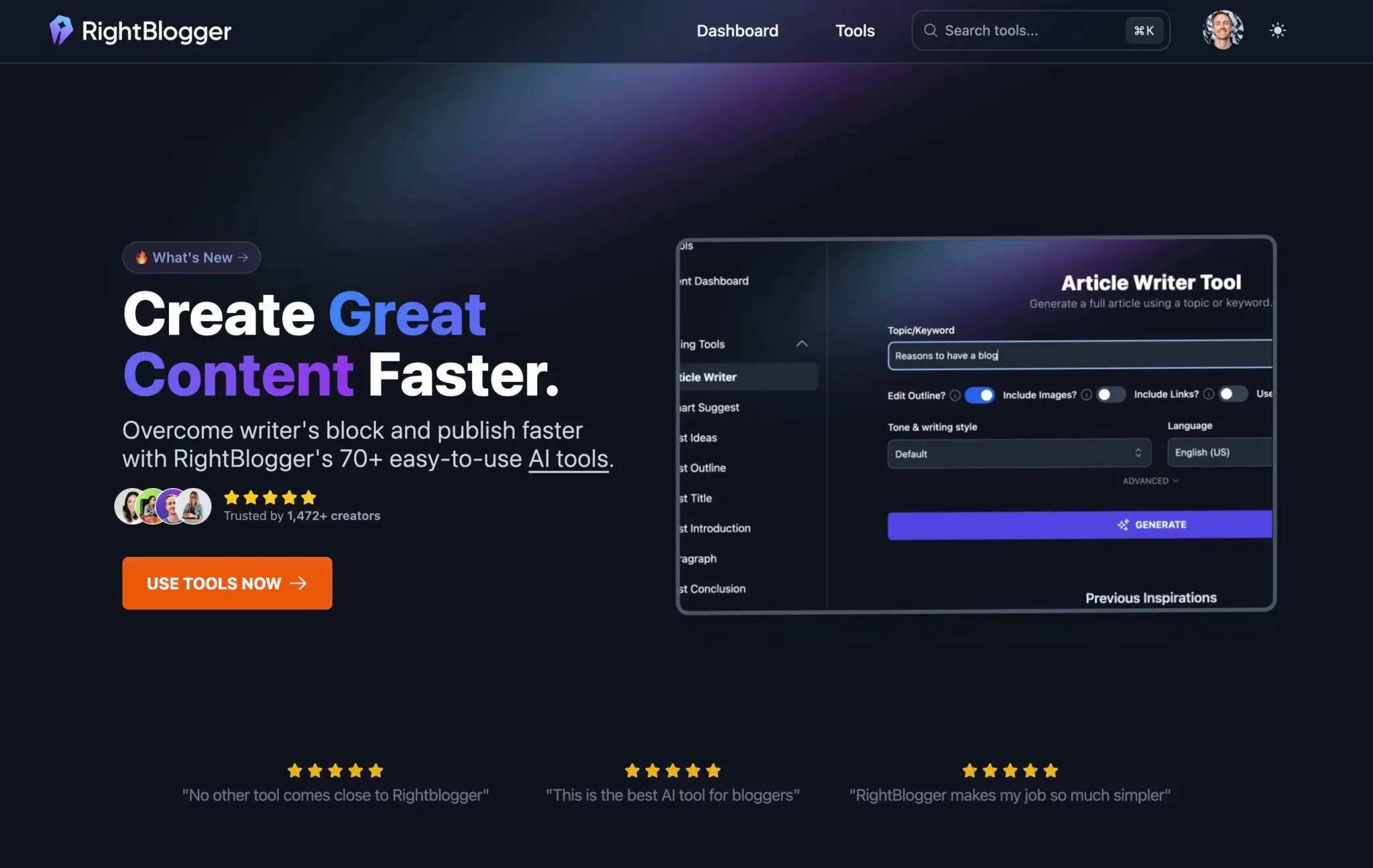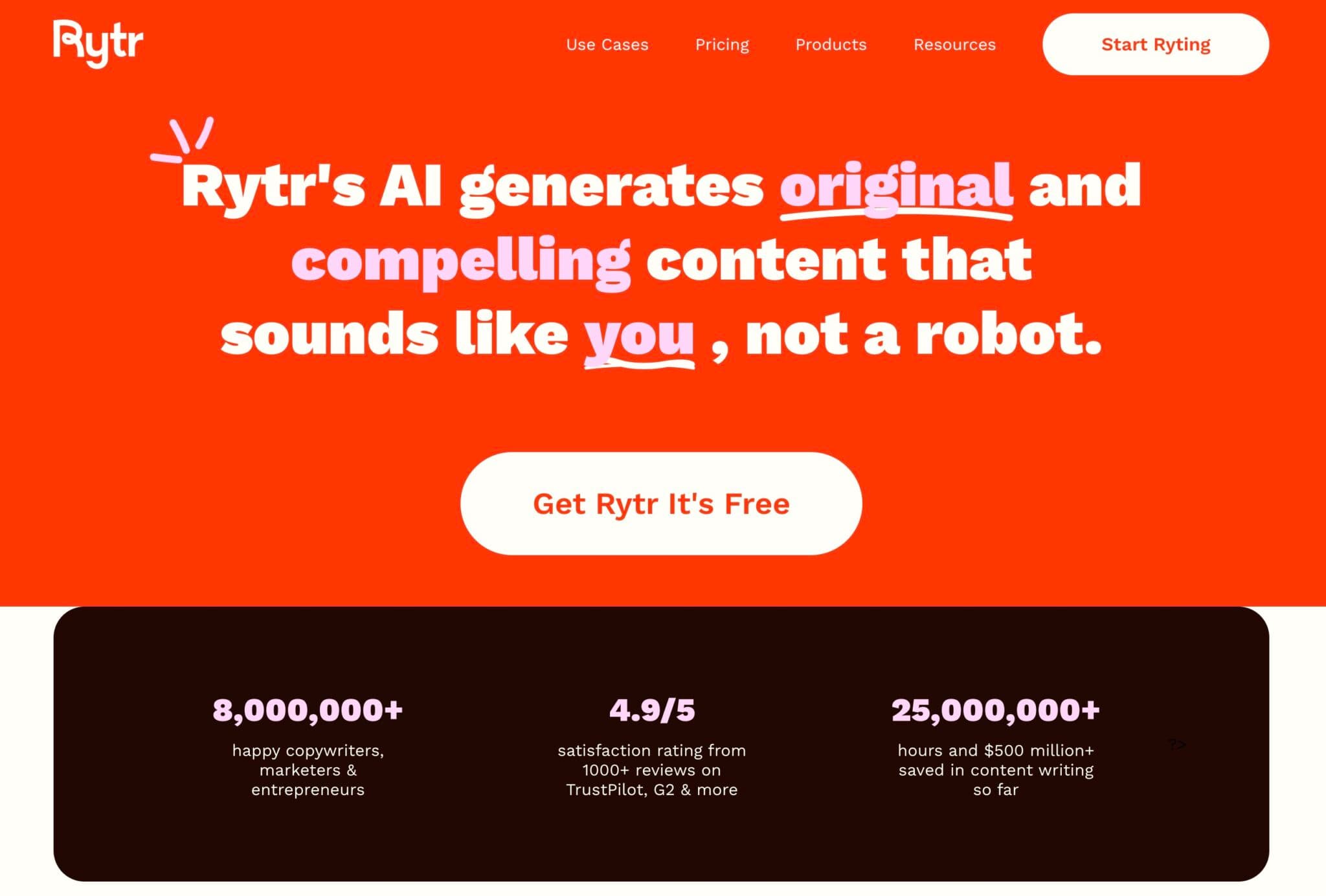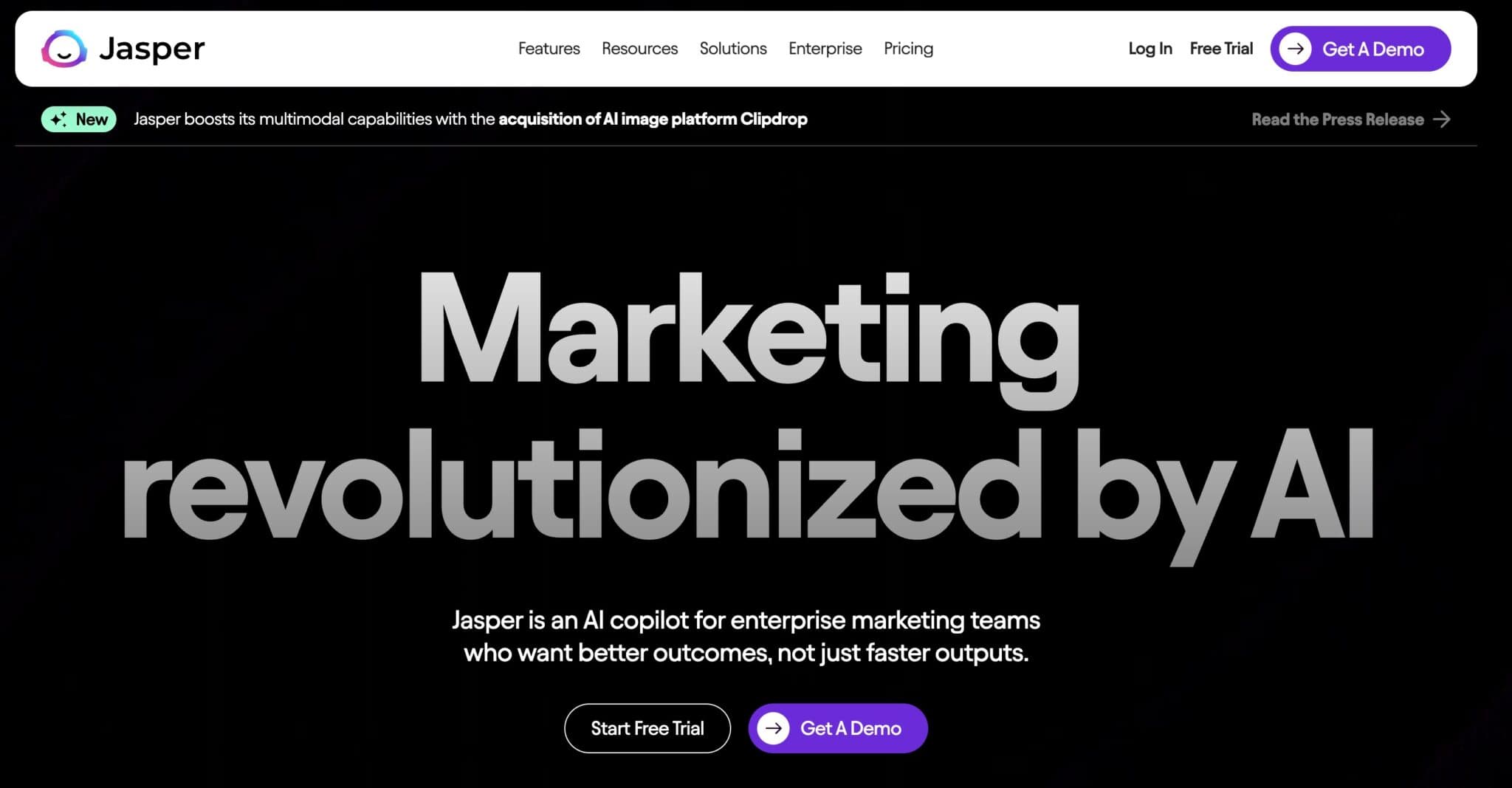AI for Content Marketers: 5 Smart Ways to Elevate Your Content Strategy

One of the best applications of generative AI today is when it comes to leveraging AI for content marketers.
Given its capabilities, it’s no surprise that Sam Altman, CEO of OpenAI, envisions AI taking over a significant portion of marketing tasks in the future. Altman suggests that AI could eventually handle up to 95% of these tasks.
While the idea that AI will handle most marketing tasks is an overstatement at this stage, there’s no denying that AI is making substantial inroads into content marketing. It’s become an indispensable tool for content marketers who want to work smarter and faster.
In this guide, we’ll show you the five effective ways to use AI in content marketing, the pros and cons of AI in content marketing, and the best AI tools for content marketers. But first, a brief introduction to AI for content marketers.
What’s AI in Content Marketing?
Artificial Intelligence (AI) refers to computer systems designed to mimic human cognitive functions. This involves programming computers to process and respond to information in ways that are human-like.
Examples include understanding and generating natural language, recognizing speech patterns, self-correcting based on past errors, and interpreting visual data.
In the content marketing industry especially, AI has proven exceptionally valuable. This is primarily due to:
- Automation Necessity: Certain repetitive tasks, like keyword research, have traditionally required automation to enhance efficiency.
- Content Generation: Among the most celebrated applications of AI in content marketing is content creation, where it excels at generating coherent and contextually relevant content.
- Managing Social Media: Repetitive tasks, like creating social media content, have become more manageable through AI social media tools.
Despite these advancements, being a successful content marketer involves more than just the ability to write well.
At RightBlogger, we believe that while excellent writing skills are crucial, effective content marketing is about developing and implementing a robust content strategy.
Then you can use AI to maximize productivity while overseeing campaign execution to ensure alignment with strategic goals.
Currently, over 65% of marketers have integrated AI into their operations, applying it at various stages of their marketing campaigns, from planning and development to execution and analysis. This widespread adoption underscores AI’s role as a transformative tool in content marketing. If you aren’t using AI in your workflows your competitors will be.
Does Google Penalize AI-Generated Content?
Many marketers share the concern that AI-generated content could incur penalties from search engines like Google. This apprehension is understandable given the importance of search engine optimization (SEO).
However, Google itself has stated that it rewards “high-quality content, however it is produced.” This indicates that your method of content creation—whether AI-generated or human-written—is not as important as the quality of the content itself.
The way we see it, Google aims to provide its users with the best and most relevant results, focusing primarily on the value and relevance of the content.
Therefore, the key to success with content, irrespective of its origin, is ensuring it meets high-quality standards that serve users effectively. When preparing to publish any article, consider the following criteria to align with Google’s expectations:
- Helpfulness: Does the content provide value and answer the questions the users might have?
- Expertise, Experience, Authoritativeness, and Trustworthiness (E-E-A-T): Does your content demonstrate those four characteristics?
- Readability: Is the content clear, well-written, and easy to understand?
- Human-centric: Does the article read as if it were written for humans, with engaging and relevant material rather than being stuffed with keywords?
- SEO Practices: Is the content optimized for search engines through strategic keyword use, meta descriptions, and alt tags?
If you can answer “yes” to all of these questions, your content is ready to be published and is likely to perform well in search engine rankings.
What are the Pros of Using AI as Content Marketers?
While this list could be a lot longer, I’ve boiled the benefits down to three main categories.
- Speedy Content Creation: Rapid content creation, meeting deadlines, and scaling content production are some of the benefits of AI for content agencies and marketers. By using AI to take care of some parts of your content creation process, such as outline generation, research, meta description writing, etc., you can execute campaigns faster.
- Efficiency: You can use AI to automate some of your repetitive tasks, such as metrics tracking, content distribution, and workflow management. Similarly, AI takes a lot less time to analyze data and draw conclusions, and this will free up time for you to focus on strategy and creativity.
- Data-Driven Marketing Strategies: With faster and more accurate tracking and data analysis done by AI, you can draw conclusions faster and let data drive your marketing strategies.
What are the Cons of AI for Content Marketers?
While AI offers numerous benefits, there are also drawbacks you should consider when incorporating AI into content marketing strategies, including:
- Diminished Creativity: Excessive reliance on AI can sap creativity, resulting in uninspired and monotonous content. It’s crucial to find a balance where AI aids in execution without overwhelming the creative process.
- Risk of Uniformity: There’s a danger that AI-generated content could become too formulaic, leading to stale, unappealing output. This is particularly risky when multiple marketers use similar AI tools for content generation. Overdependence on AI might cause your content to blend in with the crowd rather than stand out.
The key to effectively implementing AI into content marketing campaigns is striking a balance between the use of AI tools and the human touch.
Therefore, the success or failure of your content marketing strategies in the AI era depends on whether you truly know your onions.
5 Strongest Use Cases of AI for Content Marketers
Now that we’ve explored the advantages and potential pitfalls of using AI in content marketing, let’s discuss the specific applications of AI in content marketing. Here are the five strongest applications of AI for content marketers:
1. Long-form Content
It may be surprising, but AI has advanced to the point where it can generate long-form content that closely mimics the quality of human writing. However, you should note that while AI can draft substantial and coherent text, relying solely on AI for final drafts is not recommended.
AI should be viewed as a tool to assist with content creation, overcome writer’s block, accelerate the translation of research into structured text, and increase content production volumes without sacrificing quality.
Using AI effectively means maintaining a balance between quality and quantity, ensuring that your outputs meet high standards while also scaling up your publishing velocity. This approach can help you win the quality vs. quantity argument that always seems unresolved among content marketers.
Despite its capabilities, skepticism about AI replacing human writers entirely is well-founded.
AI-generated content can sometimes miss the mark, producing results that may seem nonsensical or off-topic, depending on the complexity of the subject and the AI tool’s design. So, if you want to succeed using AI, here are some strategies:
- Strategic Use: Employ AI tools for specific tasks where they excel, such as generating initial drafts or providing content outlines.
- Choosing the Right Tool: Select an AI platform that aligns with your content needs and excels at handling topics pertinent to your niche.
- Collaborative Approach: Use AI as a co-writer to enhance productivity. Edit and refine AI-generated content to ensure it meets your editorial standards and brand voice.
For example, our AI platform, RightBlogger, offers useful features that can complement traditional content creation processes, such as:
- Outlining articles
- Integrating links (internal and external)
- Incorporating unique viewpoints, which can enrich the content and provide more value to readers.

2. SEO
The use of AI in SEO is vast, including enhancement of content quality, and performance metrics tracking. AI’s applications in SEO range from automating keyword research to fine-tuning content for optimal reader engagement to sophisticated tracking of SEO metrics.
Below are some examples of how AI can enhance your SEO efforts:
Content Idea Generation
Generating a continuous stream of content ideas can be daunting. But AI tools can expand a single thought into multiple content ideas, thus fueling your content marketing strategy with a variety of topics that attract different audience segments.
For instance, RightBlogger’s Idea Generator tool can take a basic concept and turn it into ten or more unique and relevant topics. This saves time and improves your creative process by offering diverse angles on the same subject matter.
Topic Cluster Building
Creating topic clusters is an essential SEO strategy that involves developing a series of content pieces around a central theme. This approach helps establish site authority and improves search engine rankings by providing comprehensive content on specific topics.
Traditionally, building topic clusters could take hours or even days of manual research and organization. However, AI tools like RightBlogger’s Keyword Cluster tool streamline this process, allowing you to develop well-structured topic clusters more efficiently.
This tool analyzes related topics and suggests the optimal way to group them, thereby enhancing your site’s architecture and user experience.
Keyword Research
Keyword research is critical for planning your content strategy and prioritizing your articles to target the most effective keywords. AI-driven tools simplify this process by automating the heavy lifting involved in keyword analysis.
They provide insights based on search trends, keyword competitiveness, and relevance that help you make informed decisions quickly.
For instance, RightBlogger’s Keyword Research tool excels by offering deep analytical capabilities that assist in identifying high-potential keywords for your content. This speeds up the decision-making process.
3. Content Optimization
AI plays a crucial role in elevating content marketing strategies by providing deep analyses of content performance, pinpointing areas for improvement, and overall enhancing the quality of the content produced.
Tools like RightBlogger’s Content Gap Analysis Tool, and others like Surfer SEO & Clearscope can deliver actionable insights that fine-tune content strategies and increase the likelihood of your visibility on Google.

These tools offer in-depth analysis of essential SEO elements that can enhance your content’s placement on search engine results pages (SERPs).
For example, they guide you on incorporating latent semantic indexing (LSI) keywords, which assist search engines in grasping your content’s context.
They also offer advice on optimizing images to increase engagement and accessibility, conduct thorough SERP analysis to understand your competition, and perform extensive site audits to identify and address technical SEO strengths and weaknesses.
To maximize the benefits of these AI tools, here are several actionable steps:
- Conduct Periodic Content Audits: Use these tools for routine audits of your website and identify content that isn’t performing well and could be enhanced for improved outcomes.
- Add LSI Keywords: Incorporate LSI keyword suggestions from these tools into your content. This will boost the relevance and depth of your content and make it more relevant in the eyes of Google.
- Analyze Competitors: Leverage the SERP analysis features to understand what top-ranking competitors are doing right. Look for patterns in their use of keywords, content structure, and engagement strategies that you can adapt and improve upon.
- Act on Site Audit Findings: Prioritize and address the issues uncovered in site audits. This might involve fixing broken links, improving site speed, or making your website mobile-friendly.
- Track and Measure Performance: After implementing these strategies, use the same AI tools to track the performance of your optimized content. Analyze changes in rankings, traffic, and engagement to understand what’s working and refine your approach further.
4. Email Outreach
Personalized email outreach campaigns are essential for engaging with prospects and leads effectively.
When done on a large scale and frequently, the time cost might quickly build up and block you from attending to other, more demanding tasks.
AI tools can automate this process by helping you craft personalized emails, send them on schedule, and respond to emails based on recipient preferences, behaviors, and past interactions.
This leads to highly relevant and engaging emails that resonate with individual recipients, increasing the chances of conversion and customer satisfaction.
What’s more, a study from Bluecore regarding email marketing campaigns highlights a significant 139% boost in click-through rates (CTR) for personalized emails. Moreover, the analysis suggests that repeat customers tend to make more purchases, whereas converting newcomers into buyers poses more of a challenge.
If you want to use AI for your email outreach, we recommend:
- Skrapp.io: to find leads’ email addresses
- RightBlogger: to craft personalized email copy
5. Chatbots
AI chatbots are essential for giving instant responses to customer inquiries around the clock. This functionality is key for achieving high levels of customer satisfaction, as it ensures that every question is addressed promptly, no matter the time of day.
As a content marketer, building AI chatbots can save you time, allowing you to concentrate on more creative marketing endeavors rather than regular inquiries. Moreover, the data gathered from these interactions can enhance your audience segmentation strategies, leading to more focused and efficient marketing efforts.
Another aspect where AI can help you is feedback collection, which is crucial for any marketing strategy. AI chatbots make collecting this feedback easier and more interactive.
Through surveys and instant feedback mechanisms, chatbots can provide real-time insights into content performance and audience preferences, which can be incorporated into future content strategies. This instant feedback loop allows for agile marketing practices, enabling quick pivots and adaptations that can save otherwise failing campaigns.
Some tools to create chatbots of your own include:
3 Best AI Tools for Content Marketers
With the applications, benefits, and limitations of AI now clearly outlined, it’s important to recognize that not all AI tools are created equal. The market offers a variety of AI tools, each designed with specific goals in mind.
For example, tools like ChatGPT are developed for general use, spanning multiple contexts and tasks, whereas others, such as Research Rabbit, are tailored for academic research.
For content marketers, selecting the right tools is crucial to successfully using AI. This section will explore the best AI tools specifically designed for content marketing, so that you can choose the ones that best meet your strategic needs and enhance your marketing efforts.
1. RightBlogger

RightBlogger is an AI platform for bloggers and content marketers to create engaging blog posts and articles. It claims the top spot here because, unlike other AI platforms founded by entrepreneurs from various unrelated fields, RightBlogger is the brainchild of veteran bloggers and content marketers—they truly get where the shoe pinches.
Given that it’s a newcomer in the AI market, it’s pretty impressive how it’s packed with some mind-blowing features tailored just for content marketers. Let’s look at some of its standout features.
Let’s take a quick look at some of them.
Keyword Research
While keyword research is a common feature among many platforms, RightBlogger sets itself apart by integrating it with other content marketing functions, all in one place. It excels at uncovering a broad and relevant array of keywords, making it one of the most comprehensive among its peers. This feature doesn’t just find keywords; it ensures they align perfectly with your content goals.
Article Writer
RightBlogger’s Article Writer redefines collaboration between marketers and AI, enhancing speed and efficiency in content creation. It begins by asking for your point of view based on the article’s title. It then considers additional details such as the desired tone, primary keywords, and other specifications.
Before finalizing the draft, you have the opportunity to refine the outline, check adherence to SEO best practices, and discuss improvements with the tool, much like an interactive session with a freelance writer—but significantly faster. This process not only streamlines workflow but also ensures the content is tailored to your exact needs.

Content Gap Analysis
Want to outdo the top article in Google’s search results? RightBlogger’s got your back. Our Content Gap tool dives into the nitty-gritty of what top articles are doing well and where they’re lacking. It lays out clear suggestions on how you can boost your content to climb up the rankings and steal the top spot.
Keyword Cluster
Saving time while beefing up your SEO is where our Keyword Cluster tool shines. It groups well-connected topics together that you can publish to rank better on Google and establish your blog as the authority in your niche.
And there’s more where that came from. Access all these features with RightBlogger for just $29.99 a month. If you are working with multiple clients you can also set up presets using Projects in RightBlogger.
2. Rytr

Rytr is an AI-powered content assistant designed specifically for crafting short-form content, including ad copy, emails, product descriptions, meta descriptions, and various sections of a blog. Additionally, it features capabilities to assist with responding to reviews and messages, making it a versatile tool for quick communication tasks.
If you’re working with a tight budget and need a reliable AI tool for handling smaller writing duties, Rytr is an excellent option. It’s cost-effective and user-friendly, perfect for anyone looking to streamline their writing process without a significant investment.
Rytr offers a forever-free plan that provides basic features, and if you need more advanced capabilities, their paid plans begin at just $9 per month. This makes Rytr not only accessible but also a great value for content creators needing efficient and effective writing assistance.
3. Jasper AI

Jasper AI is a comprehensive AI writing assistant widely recognized for its versatility across various applications. It is one of the most popular AI writing tools available, adept at producing compelling copy, optimizing headlines, and creating engaging marketing content. Additionally, Jasper AI caters to a diverse clientele, including academic professionals and sales teams.
Primarily aimed at enterprise users, Jasper’s pricing reflects its professional-grade capabilities. Subscription plans begin at $49 per month, positioning it as a premium option in the market for those who require robust, multifunctional AI writing assistance.
Final Words on AI for Content Marketers
Content marketing is significantly enhanced by AI because the industry is naturally inclined towards automation for tasks like keyword research, analytics, and content scheduling—areas where human reach is limited.
With the rise of AI, the potential to elevate efficiency in these areas has grown exponentially. Now, the challenge for content marketers is not just to implement AI, but to strategically use it to optimize workflows and achieve better results more efficiently.
Explore the features of RightBlogger now with a free trial; no credit card required.
Does Google penalize AI-generated content?
Google does not penalize content just because AI helped create it. What matters most is whether the page is helpful, accurate, and written for people.
To stay safe, focus on quality signals like E-E-A-T (Experience, Expertise, Authoritativeness, Trustworthiness). Add real examples, clear steps, and sources when needed. Then edit for clarity and your brand voice.
A good rule is this: use AI to speed up drafts, but do not skip human review. Check facts, remove fluff, and make sure the post answers the search intent.
If you want a structured way to improve SEO after writing, tools like RightBlogger SEO Reports can help you spot issues and tighten your on-page optimization.
What are the best ways to use AI in content marketing without losing quality?
The best approach is to use AI for parts of the work, not the whole job. Let AI handle repeatable tasks, then you make the final calls on strategy, tone, and accuracy.
Strong use cases include long-form drafting, SEO planning, content optimization, email outreach, and chatbots. These are areas where speed and consistency matter, and where AI can save hours.
To protect quality, start with a clear outline, then add your unique point of view. After that, edit for helpfulness, readability, and real-world usefulness.
If you need help getting started fast, generating a solid outline first makes everything easier. Try an AI outline tool like RightBlogger Blog Outline before you draft.
How can AI help with SEO like keyword research and topic clusters?
AI can speed up SEO by turning guesses into data-backed decisions. It helps you find keywords, group them into themes, and plan content that builds authority over time.
For example, you can use AI to brainstorm content ideas, then map those ideas into a topic cluster. This makes it easier to cover a full subject and improve internal linking.
Once you have a list of keywords, prioritize by search intent and how well the topic fits your audience. Then write the best answer on the internet for that query.
If you want to build clusters quickly, RightBlogger Keyword Cluster can group related topics so you know what to publish next and how the pages should connect.
How do I stop AI-written content from sounding bland or the same as everyone else?
AI content sounds bland when it has no clear point of view. Fix this by giving the AI strong inputs and then adding your real opinions, stories, or lessons learned.
Use specific details like your audience, what you believe, what you have tested, and what you would do differently. Then remove generic lines, repeated phrases, and filler during editing.
You can also improve uniqueness by adding original examples, screenshots, quotes from your team, or a short case study. Even one small real-world example can make the content feel human.
If you want your drafts to match your style more closely, set a consistent voice guide and reuse it across posts. RightBlogger’s MyTone writing style feature can help you keep your tone steady as you scale.
How can RightBlogger help me create and optimize content faster?
RightBlogger helps you move from idea to publish-ready content with fewer steps. You can research, outline, draft, and improve SEO in one workflow, instead of jumping between tools.
For long-form writing, the RightBlogger AI Article Writer can help you draft faster, break writer’s block, and keep structure tight. You still stay in control, since you can refine the outline and edit the final output.
After drafting, focus on optimization and updates. Look for missing subtopics, weak sections, and keyword gaps, then improve the page before you publish.
If you want a clear way to compare your post to what already ranks, a content gap check is a strong next step. Use RightBlogger Content Gap to find what competitors cover that you may have missed.
Article by Andy Feliciotti
RightBlogger Co-Founder and web developer. He also shares travel photos and videos on YouTube.
New:Autoblogging + Scheduling
Automated SEO Blog Posts That Work
Try RightBlogger for free, we know you'll love it.
- Automated Content
- Blog Posts in One Click
- Unlimited Usage





Leave a comment
You must be logged in to comment.
Loading comments...